#type: media analysis
Note
you're fun to talk to about media so I've got something to ask.
what do you think of this trope where a lie or misconception becomes commonly accepted as truth by the characters in story? especially as a resolution.
example: in the finale of "Kubo and the two strings", the Moon King(main villain) loses his memory, so when he asks who he is, the townspeople lie to him and say he was a kind member of the community, rather than the dictator he really was.
I don't like it. I see a falsehood being widely accepted as a tragedy, and I'm just left imagining what happens if/when the characters find out the truth. I can't really take something as a happy ending when it's.. y'know, fake. I imagine you feel similarly.
but hey, I could have totally missed the point of the ending of KATTS, if you watched it, you might have seen something I didn't.
I haven’t seen Kubo in a really long time; I don’t think I was thinking critically about it the first time I watched it, so my opinion now is an afterthought. I’d have to see it again to be fair!
…But I do seem to remember that the villain is defeated with some importance placed on memory. And the identity of the monkey and that beetle warrior also have to do with the sacredness of memories. So, if that’s the case, then yeah, taking his memory away as a “good resolution” can kind of hamstring the whole theme of the movie. Unless you tilt your head and squint and go, “no, see, if all you have is bad memories, then it’s just as powerful to take those away—the point is, memories have power either way!” But even that feels a little half-baked, gymnastics-brainy.
Basically, I agree with you. A story that resolves with a character, or characters, accepting a lie as truth is always going to be a fumble of the whole story…unless it’s intended to be a tragedy, a cautionary tale. I can think of three where that’s super evident.
1 ) A Streetcar Named Desire
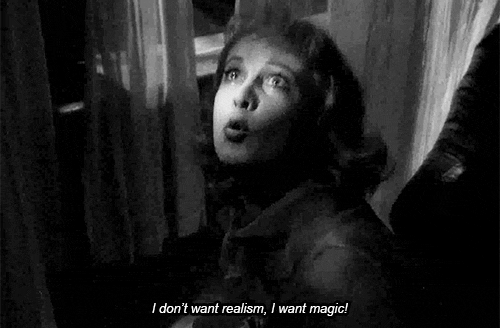
In this movie the main character, Blanche, is lying about who she is, for the whole story. She even has this great symbolism thing with light—she hates bright light, on the surface because she’s vain and doesn’t want anyone to see signs that she’s aging. But under the surface, the character is really an immoral, lust-filled, broken person who knows she can be cruel and isn’t deserving of love. She doesn’t want anyone to know that side of her. She hides it all under vainglory and pride. So she pretends to her sister, Stella, that she’s upright and moral and has simply fallen on hard times. But her sister’s brute of an abusive husband, Stanley, who is always 100% his authentic, awful self, sees through Blanche when she comes to stay with them. In the end, Stanley rapes Blanche and then carelessly shrugs her accusations off.
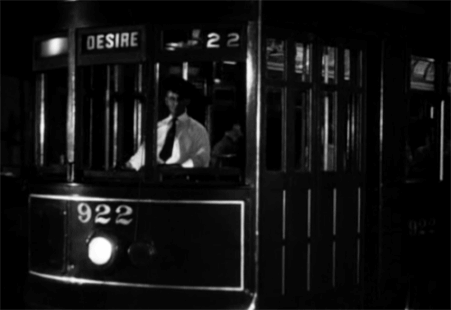
The main point of this example is that Stella, the wife of the rapist Stanley, has been portrayed the whole movie as sometimes-leaving her abusive husband…but only as far as the apartment above their own, literally right above him, so that she can easily go back to him. And at the end of the movie, when Blanche is being taken to a mental institution because she’s broken-down after being found-out as a fraud, then raped, Stella lets them take her away. And then Stella goes up to the apartment above, where she always “pretends” to leave Stanley. It’s such a halfhearted, lazy way to end a movie that’s all about desire-versus-truth. Because what it implies is that Stella is leaving Stanley for now, like she might believe that he raped her sister…but she’ll eventually go back to him. And in the meantime, Blanche goes off to the mental hospital, with this iconic line “I have always depended upon the kindness of strangers.” By which she means, “strangers don’t know what a two-faced monster I really am, so I can con them into thinking I’m a morally-upright woman fallen on hard times, and they’ll take pity on me—so sure, I’ll go with you, strange doctor I’ve never met.”
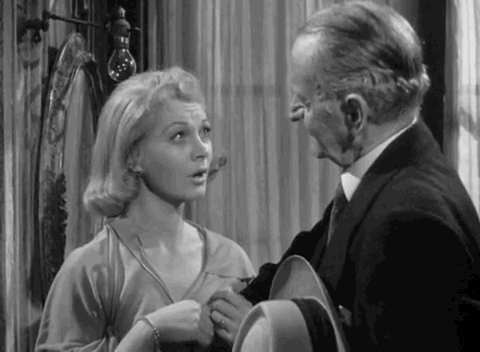
The central point of the movie is “as long as nobody looks the truth in the face, everyone can go on getting what they desire.”
Of course, that’s true. But the other truth is that, if Stella accepted what her sister and her husband really are—her sister is broken and her husband is a monster—then she could choose to rise above “animal desire.” She could choose to take care of Blanche, and Blanche would see that “someone seeing who I really am” doesn’t always have to lead to ruin and damnation. Stella could then, also, choose to really leave Stanley, for good, and be at peace, while Stanley’s “desire” would be rewarded with ruin.
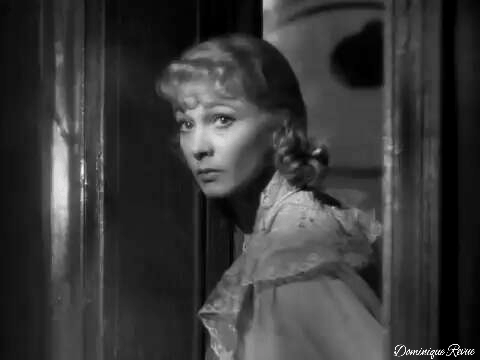
But instead the opposite is what happens. Blanche goes away believing, in her broken mind, that her womanly wiles and faking will protect her from further injury, even though they never have—Stanley ends the movie exactly where he began it, screaming for Stella to come back and knowing that she will—and Stella, too, ends the movie going away from Stanley…just for a little while, until animal desire convinces her to just pretend Stanley isn’t really a monster, Blanche must be crazy, except this time, when she goes back, she’ll be carrying a child into that abusive lie.
All characters wholeheartedly embracing hurtful lies so they can keep riding their desires. I hate that movie. You could see it as a cautionary tale. Most don’t. Most see it as a movie with “hot Marlon Brando” who “really loves Stella—all the characters ‘really love each other,’ they just don’t know how to express it healthily!” 🙄
I think the worst part is that the movie behaves as if it is true that every time Blanche reveals her own brokenness or is vulnerable, the world STOMPS on her for it, nobody loves her despite her brokenness. That’s the real mistake this movie makes. It has an opportunity to show unconditional love and it leaves the audience thinking Blanche was right, and there’s no such THING as “unconditional” love, instead.
Anyway.
2) X-Men Origins: The Wolverine
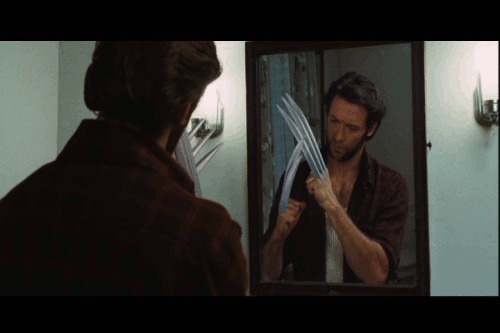
This one is less thematic. But it’s just dumb because the whole movie the main character, Logan, Wolverine, is being taught that “Giving in to Bloodlust Makes You an Animal—Compassion For Those Weaker Than Yourself Makes You Human.”
So in that context, the whole narrative is centered around the exploration of “Who is Logan/Wolverine?”
…Which makes it really stupid that the movie ends with him losing his memory. So…the movie asks “Who Are You?” and right after the character figures it out, he forgets and ends it with the answer: “I don’t know who I am.”
That’s just a waste. That’s silly. It allows you to take the character to real, hearty, coming-of-age, hero-forged-in-fire, a man-born-of-tragedy places…and then just shrug all that stuff off at the end. “Never mind. But it was a fun ride, wasn’t it?”

Especially because they built it all around the dichotomy between Logan and his brother, who’s little more than an animal—and Logan and his wife, who could be an animal, but chooses compassion instead, and reminds him of his choice, too. —and then she dies, and it’s implied that maybe his brother does too, but who cares, cuz he forgets. Who cares? Not Logan. So why should the audience?
I get that they “needed” to do this so that the end of this movie sets up the beginning of the X-Men Movies, which already established that Logan can’t remember “his past.” But like…then don’t make the point of the movie “Who Am I?” just to end on “…Okay, So WHO AM I?”
It’s a fine movie up until that point.
They should’ve made the movie center around “Can’t Change What You’ve Done; But You Can Be Redeemed.” And then show his memory loss around a moment of self-sacrifice. So that it’s still tragic, but at least when he wakes up from the self-sacrificial act, he’s “a new man.” Then later, in the third X-Men movie, when Logan chooses that mutant kid over “learning the secrets of his past,” it all comes full circle, because his “self-sacrifice moment” can stay where the Old Logan died.
Anyway. You didn’t ask me to re-tell X-Men Origins: The Wolverine. But it’s the same basic premise—a movie ends with a character losing their memory, or believing a lie—whatever.
You know, actually, this one isn’t so much “believing a lie” as it is “going back to considering the lie (that he’s an animal) because all the work done to convince him of the truth has been stupidly erased”
3) The Dark Knight
Saved this for last because nobody would read all that if they saw me scratching up the beloved Christopher Nolan Masterpiece.
But The Dark Knight is a perfect example of what you’re actually talking about.
The movie is awesome until the end.

It’s not hard to guess what I’m going to say. Harvey Dent is supposed to be a shining example of a good guy, and the goodness, that Gotham is capable of. The Goodness that will ultimately defeat Evil. And Evil is represented as Chaos.
Bruce sees that and that’s why he’s willing to give everything to make Harvey succeed as the hero Gotham needs. Because if Gotham sees that evil can be conquered by doing things the right way, the orderly way, that will get Gotham out of it’s “Justice is Broken, Vengeance is The Only Form of Justice” cycle.
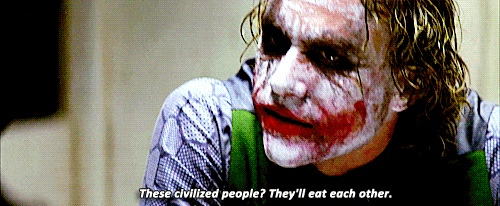
Then there’s the Joker. He doesn’t believe there’s any such thing as Good—it’s all just Chaos (which is evil.) And his big mission is to prove it. It’s ironic that he twists Harvey’s sense of “justice” around to this viewpoint—where Harvey uses “chance” as just another form of “retribution.”
Anyway. All of that’s interesting.
But the movie both perpetuates a lie and does so by having the characters end believing a lie.
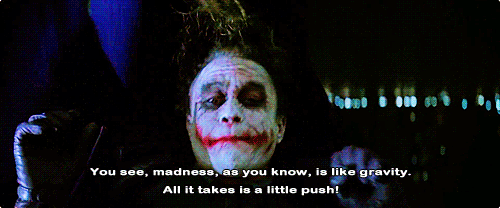
The lie it perpetuates is “The Joker is right, there’s no such thing as Justice or Good—it’s all just chaos, but pretending it’s not can get you through the day.”
That’s the lie it perpetuates!
And how does it do that?
By having the “city of Gotham,” and Bruce himself, believe a lie.

They believe Harvey Dent really was a good guy who died a hero. Bruce believes Rachel died still waiting for him, which symbolized her supposed belief in the good of Bruce and capability of Bruce to let it all go.
And why was it important that they believe those lies? Because the supposed truth is too harsh—that there’s no Good, it’s all Chaos. And if they believe that supposed truth, they’ll all turn out like Harvey or Joker. If Bruce believes Rachel chose Harvey, he’ll supposedly give up on something important in himself.
Okay but the problem with that is you have characters believing a lie because of a truth—that isn’t the truth. It’s the same problem with Streetcar.
The people of Gotham, the worst people of Gotham, aren’t always going to choose evil. There is such a thing as justice and good. And Harvey turning into Two-Face doesn’t change that. The movie could’ve shown that. It started to, with the prisoners on the second boat choosing not to kill the civilians to save themselves.

But it chose not to make that the point of the movie. It chose to make “The Joker was Right, Good is a Comforting Lie, & the Closest You’ll Ever Get to Justice is Vengeance & Chaos” the point of the movie. By having Batman convince the whole city to believe the comforting lie, what you’re saying is, Bruce believes that the truth won’t set Gotham free, only wrap it in chains.
That’s the problem with these movies.
And that’s why I think Captain America: The Winter Soldier licks The Dark Knight hollow every time, and is all-in-all a better movie, hands down. In this continued essay—
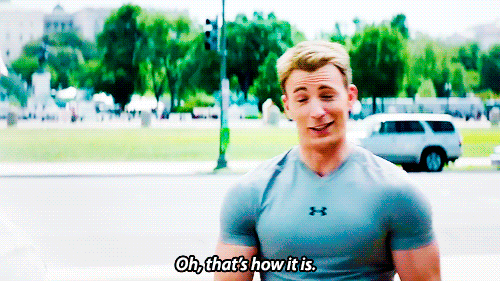
#Asked#answered#the dark knight#the dark knight trilogy#Harvey dent#Bruce Wayne#the joker#joker#heath ledger#movie analysis#tropes#comforting lies#Marlon Brando#Blanche#a streetcar named desire#Logan#x men origins: Wolverine#Wolverine#Hugh Hackman#silver fox#Captain America#media analysis#writing#character analysis#character development#classic film#greatest movies#movies
31 notes
·
View notes
Text
woke: being spider-man is a metaphor for being queer
bespoke: the idea/feeling of being in the closet is not unique to being queer, but can in fact be relevant to various aspects of life, both in fiction and in reality
broke: SPIDER-MAN ISNT GAY 😭😭😡😡😡
#spiderman#spider man#spider-man#spider woman#atsv#across the spiderverse#into the spiderverse#spiderman across the spiderverse#spiderman: across the spiderverse#spiderman itsv#into the spider verse#spiderman atsv#beyond the spiderverse#spiderman into the spiderverse#miguel spiderman#spiderman noir#miles morales#gwen stacy#miguel ohara#hobie brown#pavitr prabhakar#peni parker#peter parker#peter b parker#think piece#media analysis#media literacy#life#life is weird#spider man: across the spider verse
21 notes
·
View notes
Text


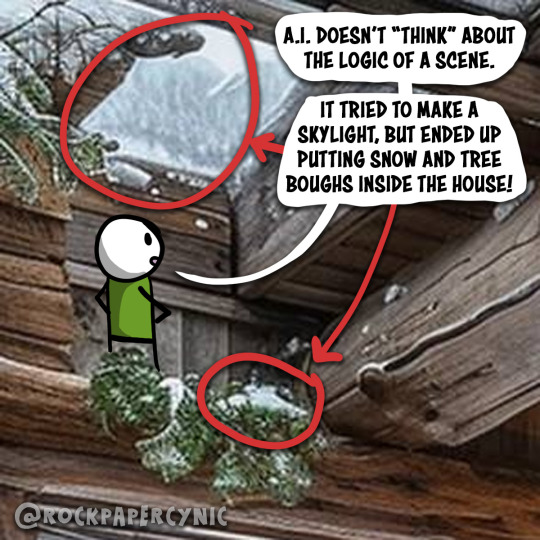
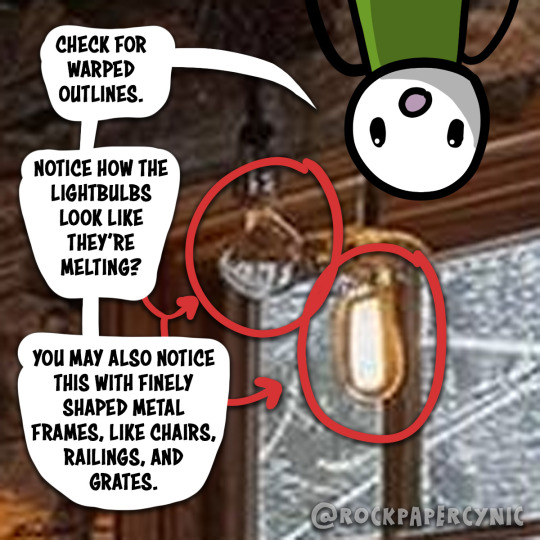
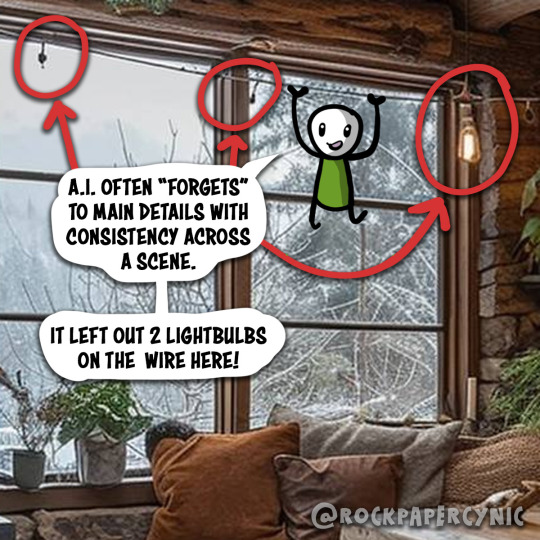
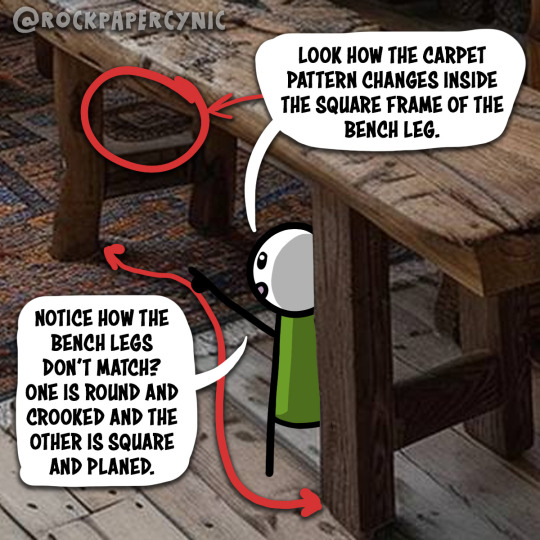

A.I. photos are flooding social media and contributing to an Internet where we can't believe what we see. Spotting A.I. 📷s is an important media literacy skill.
None of us have time to research every image we see. We just need people to notice BEFORE THEY LIKE OR SHARE that an image might be fake. If unsure, check it or don't share.
I've started drawing some comics explaining the basic of AI spot-checking and media literacy in the age of disinformation. Follow along here or on my Twitter.
31K notes
·
View notes
Text
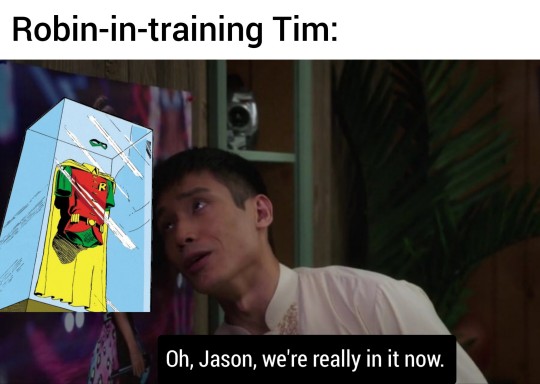
#memes#my memes#i made this#funny memes#the good place meme#dc memes#dc comics#dc#comics#tim drake#robin#robin tim drake#kid tim drake#jason todd#robin jason todd#batfam#batkids#comic books#funny#batman comics#robin comics#detective comics#tim drake compendium#humor#batfamily#media analysis#comic analysis#media commentary#character analysis#robins
9K notes
·
View notes
Text

[IMAGE ID: The American Chopper Argument Meme that reads: "Deadpool 3 wasn't a good movie because the anchor being concept didn't make sense and neither did the cameos, it was supposed to be about deadpool." In the second panel, "Anchor beings are a commentary on Marvel's fucked up money-making scheme and destroying characters who are popular to the audience which puts more money in their pockets." The third panel states, "The cameos still shouldn't have been there! They made no sense!" Followed by, "Deadpool wanted to be a hero since the first Deadpool movie and continues to be rejected over and over and you think it's not important for him to meet people who were rejected by the industry and forgotten? To not only make a jab at big industries but also for himself and his repeating themes?" / END ID]
Guys, I might be passionate about this movie, I don't think it's noticeable./s
#fox speaks#deadpool and wolverine#deadpool#wolverine#wade wilson#logan howlett#poolverine#deadclaws#wolverpool#deadpool movie#deadpool 3 spoilers#media analysis#image described
7K notes
·
View notes
Text
You! American fan of foreign or otherwise un-American media! Are you aware of the nuances and cultural differences that are portrayed in that media and have an understanding that you as an outsider looking in should be careful with the lenses you analyze that media in because you have a different perspective that is not catered to?

#media analysis#this post was made by an American btw#fandom culture#fandom#also that subtitles and translations are not always exactly correct
30K notes
·
View notes
Text
headcanon: "i have decided that this is true about the character, and it doesn't matter to me if the canon text supports my idea or not."
interpretation: "after considering elements present in the canon text, I have decided that this might be true about the character and here's why."
subtext: "I can show you strong evidence in the text and context of the work that this interpretation could be the actual authorial intent."
9K notes
·
View notes
Text
I used to work for a trade book reviewer where I got paid to review people's books, and one of the rules of that review company is one that I think is just super useful to media analysis as a whole, and that is, we were told never to critique media for what it didn't do but only for what it did.
So, for instance, I couldn't say "this book didn't give its characters strong agency or goals". I instead had to say, "the characters in this book acted in ways that often felt misaligned with their characterization as if they were being pulled by the plot."
I think this is really important because a lot of "critiques" people give, if subverted to address what the book does instead of what it doesn't do, actually read pretty nonsensical. For instance, "none of the characters were unique" becomes "all of the characters read like other characters that exist in other media", which like... okay? That's not really a critique. It's just how fiction works. Or "none of the characters were likeable" becomes "all of the characters, at some point or another, did things that I found disagreeable or annoying" which is literally how every book works?
It also keeps you from holding a book to a standard it never sought to meet. "The world building in this book simply wasn't complex enough" becomes "The world building in this book was very simple", which, yes, good, that can actually be a good thing. Many books aspire to this. It's not actually a negative critique. Or "The stakes weren't very high and the climax didn't really offer any major plot twists or turns" becomes "The stakes were low and and the ending was quite predictable", which, if this is a cute romcom is exactly what I'm looking for.
Not to mention, I think this really helps to deconstruct a lot of the biases we carry into fiction. Characters not having strong agency isn't inherently bad. Characters who react to their surroundings can make a good story, so saying "the characters didn't have enough agency" is kind of weak, but when you flip it to say "the characters acted misaligned from their characterization" we can now see that the *real* problem here isn't that they lacked agency but that this lack of agency is inconsistent with the type of character that they are. a character this strong-willed *should* have more agency even if a weak-willed character might not.
So it's just a really simple way of framing the way I critique books that I think has really helped to show the difference between "this book is bad" and "this book didn't meet my personal preferences", but also, as someone talking about books, I think it helps give other people a clearer idea of what the book actually looks like so they can decide for themselves if it's worth their time.
Update: This is literally just a thought exercise to help you be more intentional with how you critique media. I'm not enforcing this as some divine rule that must be followed any time you have an opinion on fiction, and I'm definitely not saying that you have to structure every single sentence in a review to contain zero negative phrases. I'm just saying that I repurposed a rule we had at that specific reviewer to be a helpful tool to check myself when writing critiques now. If you don't want to use the tool, literally no one (especially not me) can or wants to force you to use it. As with all advice, it is a totally reasonable and normal thing to not have use for every piece of it that exists from random strangers on the internet. Use it to whatever extent it helps you or not at all.
45K notes
·
View notes
Text
The Feelings Of The Average Israeli Occupational Soldier: A Quick Analysis By James Ray
If you haven't already, follow him on tiktok. (@jamesgetspolitical) He gives constant updates on the genocide in Palestine but also offers food for thought in his content.
Free Palestine, End The Occupation🇵🇸‼️
#free palestine#gaza#palestine#free gaza#from the river to the sea palestine will be free#pray for palestine#media analysis#facism#israeli soldiers#israel terrorist forces#israel is committing genocide#genocide#facists#israel#ceasefire#permanent ceasefire#america#usa
8K notes
·
View notes
Text
just… Goro Miyazaki starting his animation career with having a son kill his father, the king of a kingdom where magic is disappearing, and run away and Hayao (possibly ending) his career with a young boy refusing to take on his family’s powerful legacy over a magical world, knowing the world would die without him in favor of not abandoning his family and choosing to live contentedly in the mundane world…
#reactorshaft babble#not star wars#the boy and the heron#hayao miyazaki#goro miyazaki#studio ghibli#tales from earthsea#media analysis#meta#the boy and the heron spoilers#father son relationship#🥺🥺🥺#spoilers
9K notes
·
View notes
Text
Aziraphale was about to confess too before Metatron and his coffee came into the bookshop;
Okay, hear me out. In 2x02, when they’re talking about “how people fall in love”, Crowley talks about sudden rainstorms,
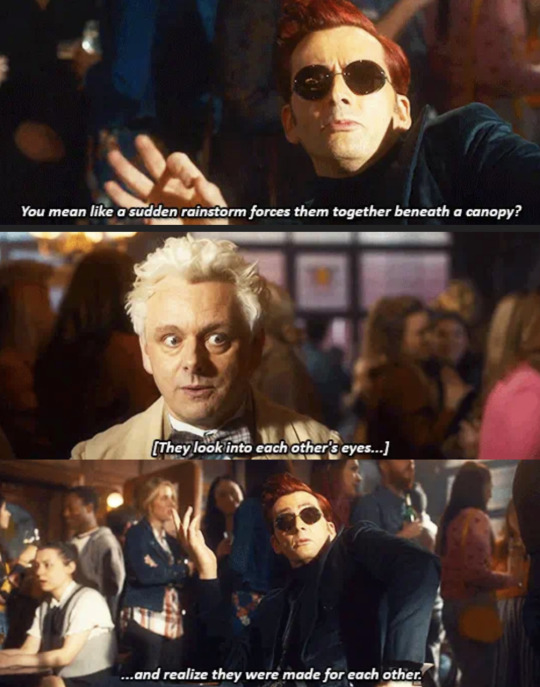
which is an obvious reference to how he fell in love, about 6000 years earlier (poor demon thinks everyone falls in love the way he did)
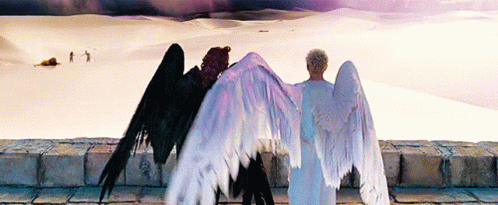
Aziraphale doesn’t get it and answers “seems a bit unlikely”. He didn’t connect the dots, he doesn’t think Crowley loves him that way. All he knows about falling in love is what he read in books. Of course he fell in love with Crowley too, but I’m pretty sure he did in ‘41 when Crowley saved his books from a bomb, and that’s a bit hard to recreate, so… balls.
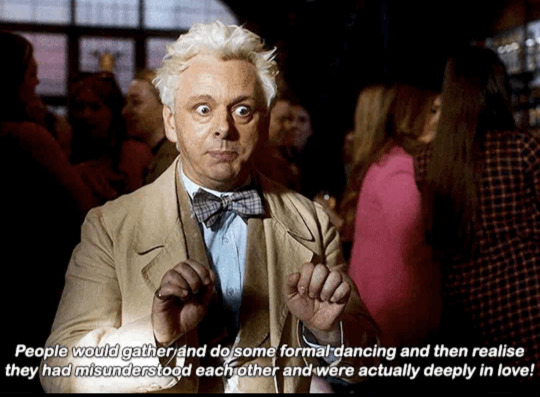
That’s his idea, you make two people dance together and they magically fall in love, which is so in-character I want to scream. Now let’s get to 2x05. We know Aziraphale always tried to avoid organizing those meetings, but he’s suddenly so excited about it he is WILLING TO GIVE AWAY HIS BOOKS. Why would he do something like that? There’s no way it’s actually to make Maggie and Nina fall in love. At that point, Muriel doesn’t even care anymore about it, they all know the truth about the miracle is about to be revealed, so there’s no point in being so persistent about Maggie and Nina’s relationship. He’s an angel; of course he cares about humans being happy, but I don’t think he cares so much about two semi-strangers’ love life that he’s willing to give away BOOKS for the off chance that the Jane Austen method will actually work on two humans he knows nothing about. So, my conclusion is, he’s organizing that night for him and Crowley. They are the ones that he hopes realize they’re deeply in love with each other, and that is something worth giving away books for. Which explains why he’s so excited but also a bit scared when he asks Crowley to dance with him.
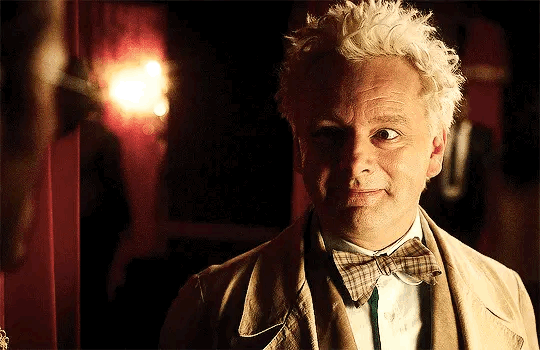
It explains why he ignores the fact that Crowley is trying to tell him that something important and dangerous is about to happen, just so they can have a little dance. It also explains this reaction when he sees Gabriel and Beelzebub being in love with each other
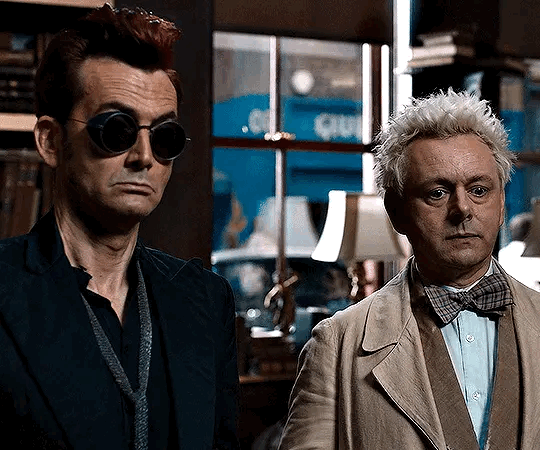
and the way he looks at Crowley while they’re talking about them.
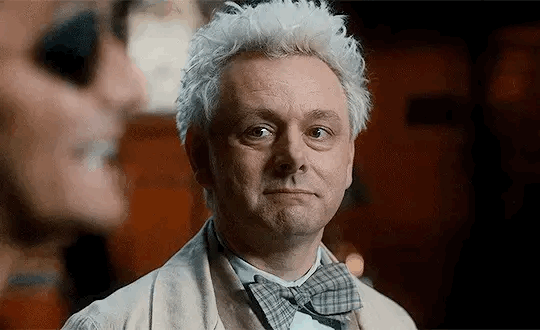
I mean, I know he always stares lovingly at him, but not like that, right? That’s a face that screams “I’m so going to tell you I love you when all this is over”.
So, my point is:
Fuck Metatron.
That’s my point.
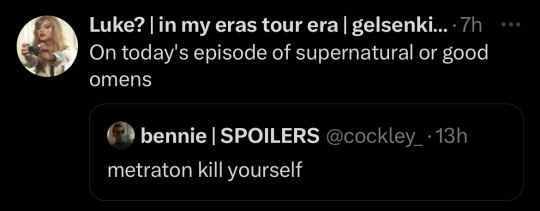
Imago
17K notes
·
View notes
Text
Started rereading the Hunger Games series and I feel like it’s so overlooked how in 74th and 75th Hunger Games, we don’t know every Tribute’s names, with Katniss only referring to them by their District numbers but in TBOSAS, we knew every single Tribute by name. We associated them with the clothes they wore on the Reaping Day and Suzanne even goes so far as to describe how they looked, however briefly. We see these Tributes and we’re familiarized with them by the little tidbits provided to the mentors and to Snow and Lucy Gray. But we never get this in the original trilogy.
In two generations, President Snow alienated the Districts from each other so much that Katniss didn’t even care to know all the names of the Tributes sent into the Arena with her, with the exception being those who posed great risk against her safety and those she felt great compassion for (e.g. Cato, Thresh, Rue, Mags, Betee, Wiress etc.). Katniss even went so far as to call the D6 Tributes in the 75th Hunger Games morphlings, for their affinity to imbibe in the drugs that help them forget their own traumas (an incredibly hurtful description, in my own opinion, to be known by the qualities you hate the most about yourself). We never know the real name of the 74th D5 girl, with Katniss only referring to her as Foxface and we don’t even know Marvel’s name until we get to the second book and he was Katniss’ first personal kill. Katniss even kills the D4 girl in the books with the same tracker jacker venom that killed Glimmer and yet still, we don’t know her name. We are so removed from the identity of the other Tributes that we don’t even know what some of them looked like beyond brief descriptions of mangled bodies and dead Tributes in the bloodbath at the Cornucopia.
And, the thing is, Suzanne established the importance of names in the series. Even in real life, we recognize the importance of being named. It is a fundamental aspect of being human. If you’re ever in a perilous situation where a person might be placing your life in danger, we’re told to remind the person that you’re human. “Keep saying your name, how old you are, where you came from. Remind them you are a human being just like them.” Before any propaganda can work against a group of people, refusing to recognize a person’s name is the first step to dehumanization. And just like the people of the Districts, we don’t care enough about the other Tributes to even want to know their names. Their propaganda worked on us, the readers.
In two generations, President Snow completely wiped out any sense of familiarity and camaraderie the Districts may have shared with the other. In two generations, Snow sowed the seeds of distrust and division into the Districts so deeply that even we, the readers, were affected by the effects of Capitol propaganda. In two generations, the Districts ceased to genuinely care about the others beyond the vague sense of injustice they feel for their shared plight. It’s why Career Districts don’t seem to care about killing the other Tributes. How can you care, to show your compassion and humanity, when you can barely see them as people? Yes, they may have been in the Arena with you. Yes, they may have been starved and beaten and forced into labor like you were. Yes, they might be children just like you. Yes, they might be subjected to the same deplorable system that turned you into virtual slaves. But they are not your friends. They are not your allies. They are strange, with different customs and traditions that you have. You do not share the same values. They do not care about you. At the first chance they get, they will kill you with your bare hands and they will do it with alacrity if it meant their survival. There can only be one Victor and it can’t be them. It has to be you.
#the hunger games#hunger games#katniss everdeen#peeta mellark#finnick odair#media analysis#haymitch abernathy#sunrise on the reaping#the ballad of songbirds and snakes#tbosas#thg#catching fire#mocking jay#mockingjay#coriolanus snow#effie trinket
3K notes
·
View notes
Text
bro i luv spider-punk but i specifically wanna talk about his hair
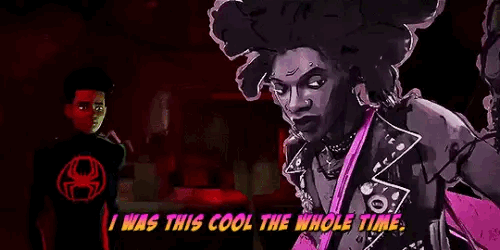
he. has. wicks!!!
the origin of wick dreadlocks is florida usa, and are named due to the resemblance to a "candle wick" because of how they stick straight up and/or out!
now, wicks have a bad reputation even within the loc community.
its already known that like if you got dreads, generally, ppl think u are unkempt, and dirty, and things of that nature, but there is even more discrimination against wicks its unreal. like legit yall i cant even begin to explain the nasty shit ppl say about them because i will be sad.
its kinda just considered the "crazy Florida man hairstyle". and a lot of the hate is due to the fact that wicks, appear "unkempt" or things of that nature
there has been a lot of texturism in the loc community which has brought with it the idea that dreads need to be retwisted to be "properly" taken care of, and need to be flat on your head and all these other things that often bring with it the need to hide your natural hair. i get unsolicited advice on my hair all the time telling me "i need a retwist" because of the belief that black hair needs to be all tidy and stuff to be respected.
but the thing is, dreads aren't meant to be all neat and tidy all the time y'know. its black hair in one of its most natural forms. and who better to showcase that than hobie brown, spider punk?
wicks kinda go against everything that dreads are "supposed" to be and "supposed" to look like.
i just love everything about this movie but i especially wanted to like talk about this hair choice. hair most def has meaning, especially black hair, so i think this was a really cool and fitting design choice for his character and everything he represents.
(i did my best to like articulate my thoughts but hopefully this makes at least a bit a sense)
#across the spiderverse#into the spider verse#spider punk#hobie brown#he is soo fucking cool#media analysis#kinda..#dreadlocks#flashing lights#eyestrain#ive added the image description to the alt text i hope this helps
12K notes
·
View notes
Text
Gendered pronouns in Japanese vs English
In Revolutionary Girl Utena, the main character Utena is a girl (it says so in the title), but very conspicuously uses the masculine first person pronoun 僕 (boku) and dresses in (a variation of) the boys school uniform. Utena's gender, and gender in general, is a core theme of the work. And yet, I haven’t seen a single translation or analysis post where anyone considers using anything other than she/her for Utena when speaking of her in English. This made me wonder: how does one’s choice of pronouns in Japanese correspond to what one’s preferred pronouns would be in English?

There are 3 main differences between gendered pronouns in Japanese vs English
Japanese pronouns are used to refer to yourself (first-person), while English pronouns are used to refer to others (third-person)
The Japanese pronoun you use will differ based on context
Japanese pronouns signify more than just gender
Let’s look at each of these differences in turn and how these differences might lead to a seeming incongruity between one’s Japanese pronoun choice and one’s English pronoun choice (such as the 僕 (boku) vs she/her discrepancy with Utena).
Part 1: First-person vs third-person
While Japanese does technically have gendered third person pronouns (彼、彼女) they are used infrequently¹ and have much less cultural importance placed on them than English third person pronouns. Therefore, I would argue that the cultural equivalent of the gender-signifying third-person pronoun in English is the Japanese first-person pronoun. Much like English “pronouns in bio”, Japanese first-person pronoun choice is considered an expression of identity.
Japanese pronouns are used exclusively to refer to yourself, and therefore a speaker can change the pronoun they’re using for themself on a whim, sometimes mid-conversation, without it being much of an incident. Meanwhile in English, Marquis Bey argues that “Pronouns are like tiny vessels of verification that others are picking up what you are putting down” (2021). By having others use them and externally verify the internal truth of one’s gender, English pronouns, I believe, are seen as more truthful, less frivolous, than Japanese pronouns. They are seen as signifying an objective truth of the referent’s gender; if not objective then at least socially agreed-upon, while Japanese pronouns only signify how the subject feels at this particular moment — purely subjective.
Part 2: Context dependent pronoun use
Japanese speakers often don’t use just one pronoun. As you can see in the below chart, a young man using 俺 (ore) among friends might use 私 (watashi) or 自分 (jibun) when speaking to a teacher. This complicates the idea that these pronouns are gendered, because their gendering depends heavily on context. A man using 私 (watashi) to a teacher is gender-conforming, a man using 私 (watashi) while drinking with friends is gender-non-conforming. Again, this reinforces the relative instability of Japanese pronoun choice, and distances it from gender.

Part 3: Signifying more than gender
English pronouns signify little besides the gender of the antecedent. Because of this, pronouns in English have come to be a shorthand for expressing one’s own gender experience - they reflect an internal gendered truth. However, Japanese pronoun choice doesn’t reflect an “internal truth” of gender. It can signify multiple aspects of your self - gender, sexuality, personality.
For example, 僕 (boku) is used by gay men to communicate that they are bottoms, contrasted with the use of 俺 (ore) by tops. 僕 (boku) may also be used by softer, academic men and boys (in casual contexts - note that many men use 僕 (boku) in more formal contexts) as a personality signifier - maybe to communicate something as simplistic as “I’m not the kind of guy who’s into sports.” 俺 (ore) could be used by a butch lesbian who still strongly identifies as a woman, in order to signify sexuality and an assertive personality. 私 (watashi) may be used by people of all genders to convey professionalism. The list goes on.
I believe this is what’s happening with Utena - she is signifying her rebellion against traditional feminine gender roles with her use of 僕 (boku), but as part of this rebellion, she necessarily must still be a girl. Rather than saying “girls don’t use boku, so I’m not a girl”, her pronoun choice is saying “your conception of femininity is bullshit, girls can use boku too”.

Through translation, gendered assumptions need to be made, sometimes about real people. Remember that he/they, she/her, they/them are purely English linguistic constructs, and don’t correspond directly to one’s gender, just as they don’t correspond directly to the Japanese pronouns one might use. Imagine a scenario where you are translating a news story about a Japanese genderqueer person. The most ethical way to determine what pronouns they would prefer would be to get in contact with them and ask them, right? But what if they don’t speak English? Are you going to have to teach them English, and the nuances of English pronoun choice, before you can translate the piece? That would be ridiculous! It’s simply not a viable option². So you must make a gendered assumption based on all the factors - their Japanese pronoun use (context dependent!), their clothing, the way they present their body, their speech patterns, etc.
If translation is about rewriting the text as if it were originally in the target language, you must also rewrite the gender of those people and characters in the translation. The question you must ask yourself is: How does their gender presentation, which has been tailored to a Japanese-language understanding of gender, correspond to an equivalent English-language understanding of gender? This is an incredibly fraught decision, but nonetheless a necessary one. It’s an unsatisfying dilemma, and one that poignantly exposes the fickle, unstable, culture-dependent nature of gender.

Notes and References
¹ Usually in Japanese, speakers use the person’s name directly to address someone in second or third person
² And has colonialist undertones as a solution if you ask me - “You need to pick English pronouns! You ought to understand your gender through our language!”
Bey, Marquis— 2021 Re: [No Subject]—On Nonbinary Gender
Rose divider taken from this post
#langblr#japanese#japanese language#language#language learning#linguistics#learning japanese#utena#revolutionary girl utena#shojo kakumei utena#rgu#sku#gender#transgender#nonbinary#trans#official blog post#translation#media analysis
1K notes
·
View notes
Text
Two things can be and are true at once.
Robin Jason was a sweet, kind kid who cared about victims. He also had righteous rage and violent tendencies towards those he thought deserved it.
Being Robin gave him magic and as Robin he shattered a man's collarbone with no remorse.
#dc comics#dc#comics#comic books#under the red hood#utrh#batman comics#jason todd#red hood#robin jason todd#kid jason todd#jason peter todd#jason todd wayne#robins#batfam#batkids#character analysis#media commentary#batfans#batfandom#duality of man#media analysis#comic analysis#fandom critical
8K notes
·
View notes
Text
Honestly, viewing Ford & Fiddleford’s relationship from the perspective of a Gravity Falls citizen is kind of crazy because, it’s the early 80s & this elusive, out-of-towner scientist has been working & living by himself in a secluded woodland cabin for like 6 years & then, all of a sudden, this southern scientist guy joins him &, on occasion, they start showing up in town together, going to the carnival with one another & eating at the diner together amongst various other activities.
As the months pass, the cracks in their relationship begin to show, even to outsiders, all the while coinciding with even stranger occurrences than normal. Unexplained beams of light emanate from their shared cabin, gravity’s pull on the Earth lessens, causing people & objects to float in midair at random intervals & the scientists themselves seem visibly sleep-deprived, on-edge & paranoid.
This escalates to them having a very public & highly volatile argument at the local diner they frequent, in front of numerous other patrons. They’d see Ford storm off & curse Fiddleford under his breath, tossing a ring into the lake. They’d see Fiddleford’s desperation & fear, as he hopelessly urges Ford to accept the thesis (which, to them, just look like various non-specific papers) he painstakingly put together for him, pleading with him to abandon their project.
Then, with no warning, the southerner just disappears, only to reemerge years, if not decades later as a crazed recluse. The main scientist, however, he’s still showing up in town, but this time around he’s different somehow, he’s wild, unhinged & downright masochistic. He wreaks havoc on the townsfolk & upon himself as he harasses law enforcement, strips naked, eats live spiders, & even becomes an early adopter of the “tramp stamp” &, is overall, a general nuisance.
After causing a bit of chaos, he just straight up disappears for a few weeks until he announces that now he gives guided tours of his lab & has a mullet. Nearly all of this happens before the Society of the Blind Eye has properly formed too, so unless Fiddleford was just going on mass mind erasing sprees in his spare time, there’s no way people forgot about this, at least not immediately.
In conclusion, all of this just looks like an extremely messy breakup, which, is partially true, lmao.
#rambling about these two sorry#back on my bullshit#gravity falls#ford pines#fiddleford mcgucket#fiddauthor#media analysis
1K notes
·
View notes